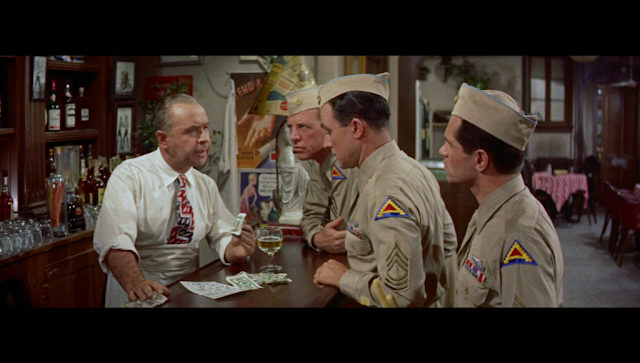 |
| Kathryn Grayson and Howard Keel in Kiss Me Kate |
Censorship has erased some of the bawdiness from Cole Porter's lyrics but his music still remains. Howard Keel is swaggeringly handsome as Fred Graham/Petruchio and Ann Miller is thoroughly vivacious as Lois Lane/Bianca. She is accompanied by a trio of terrific dancers, Tommy Rall, Bobby Van, and Bob Fosse, in numbers choreographed by Hermes Pan (with some uncredited assistance from Fosse in the "From This Moment On" number, where he gets an extended duo with an almost unbilled Carol Haney). The adaptation of the Broadway hit stumbles a little in Dorothy Kingsley's screenplay, but rights itself in most of the musical numbers. George Sidney was never as skillful a director as his MGM contemporaries Vincente Minnelli and Stanley Donen, but the stretches between the story parts and the song and dance parts aren't overlong. The only major drawback to this version of Kiss Me Kate is Kathryn Grayson, who pouts a lot as Lilli Vanessi/Katherine, but doesn't have much chemistry with Keel and fails to make the character someone we care about. Her voice, too, has that vinegary edge to it that even careful miking can't hide. Nor do Keenan Wynn and James Whitmore succeed in their attempts at clowning as the goofy gangsters with their supposedly show-stopping number, "Brush Up Your Shakespeare." (How, by the way, did the line "Kick her right in the Coriolanus" get past the censors?) Still, this is a solid B-plus MGM musical, and an honorable attempt at remaking a stage version. It was made in 3-D, during the brief period in the 1950s when the studios were trying to win audiences back away from their televisions, which explains some of the exaggerated perspective of the stage sets and the occasional instances of things being tossed at the camera.











